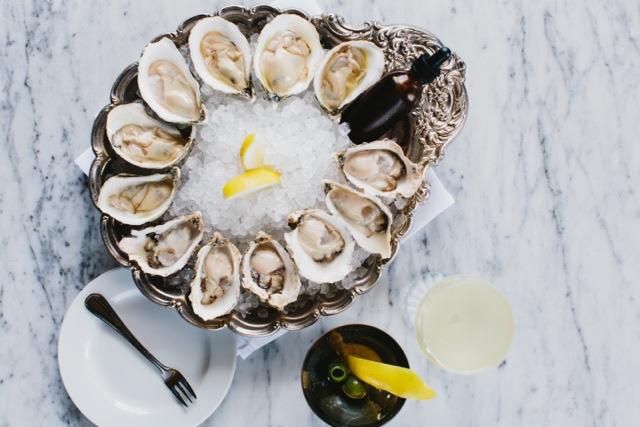Section Branding
Header Content
Atlanta's Most Unusual Breakfast
Primary Content
As business manager and shellfish director of Kimball House, Bryan Rackley's mornings often begin with him opening multiple boxes of oysters. Some come via freight shipping, some via couriers. They're packed in ice or surrounded by special gel coolants. The mussels come from places like Skunk Island, Washington and Yarmouth, Nova Scotia. Offerings from Virginia, California, and South Carolina are often in the mix as well.
An interview with Bryan Rackley
Before he’s had his first cup of coffee, Rackley can shuck and suck a dozen oysters or more, sipping the liquor of each one before he swallows the meat. Each type of oyster is unique. They vary in appearance, size and salinity. And, of course, in taste.
Eyes closed, he savors each oyster, taking deep breaths to draw in the aromas. He contemplates. "It would look ridiculous to anybody who's watching me."
As each one goes down, Rackley reels off descriptions. He mentions lemon and grass. He gets elemental, he tastes wood and clay. One oyster starts “sweet like a haunting baking spice” before it ends dry and acidic.
He carries on a running debate with himself. Bitter cucumbers are pitted against pea tendrils, a clear victor doesn't emerge. “It literally tastes like biting down on a handful of sea beans.” Sea beans? Rackley clarifies for the uninitiated, “It’s great, it’s like eating sea popcorn.”
Fruit, vegetation, and licorice are mentioned. “It tastes like cured meat with a little smear of butter on it. That’s good. I’m going to rewrite that one.”
And so he does. Inspiration ingested, Rackley regularly revisits and refines his descriptions of Kimball House’s ever-evolving menu of oysters. The Decatur restaurant, and Rackley in particular, have been at the forefront of a small renaissance that aims to elevate oysters beyond their traditional associations by working with individual farmers and distributors to highlight not only the broad spectrum available but to encourage consumers and restaurateurs to experiment and expand their expectations. Without the crutches of classic accoutrements like crackers, hot sauce and so on, Rackley, even with his zealotic enthusiasm and kaleidoscopic descriptions, really just has a single goal in mind: consider the oyster.
Audio production: Jenny Ament
Text: Ezra Morris

